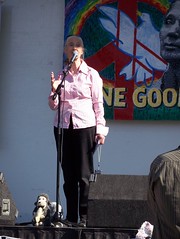November 23rd, 2007 by JJW
 My second interview with Dr. Jane Goodall, DBE, personal hero, friend and bringer of hope to youth of all ages. Published on China Dialogue. I saw her in LA the next day at her annual Roots & Shoots Day of Peace event in Griffith Park. When I asked her about how she greeted Pan Yue, she smiled and said, “Oh no! More questions?” Yes, more questions. And lots of answers. Quite an inspirational interview.
My second interview with Dr. Jane Goodall, DBE, personal hero, friend and bringer of hope to youth of all ages. Published on China Dialogue. I saw her in LA the next day at her annual Roots & Shoots Day of Peace event in Griffith Park. When I asked her about how she greeted Pan Yue, she smiled and said, “Oh no! More questions?” Yes, more questions. And lots of answers. Quite an inspirational interview.
November 5th, 2006 by JJW
by Joshua Wickerham for that’s Shanghai, October 2006
now in her seventies, renowned primatologist Jane Goodall is fighting harder than ever for a better future
British primatologist Dr. Jane Goodall first won fame in the 1960s with her pioneering studies of chimpanzees in Gombe National Park in Tanzania. Since then she’s worked tirelessly to promote rights for all animals, chimpanzees included. In 1991, while conferring with students in Tanzania about their hopes for extracurricular programs, she founded Roots & Shoots (R&S), a youth education group that provides students with the experience to tackle problems concerning the relationship between people, animals, and the environment. In the intervening 16 years, R&S has spread to over 90 countries. China has four branches, in Beijing, Chengdu, Nanchang, and Shanghai, and there are R&S clubs in hundreds of local schools. Greg MacIsaac founded the first Chinese branch in Beijing in 1993. In 2003, the Shanghai branch became the first foreign non-profit organization to be granted official status by the Chinese government [see Terms of Development, Sept 2006], followed by the branch in Nanchang this year. Goodall will be in Beijing and Shanghai this month.
that’s: You first visited China about 13 years ago. Since then, what changes have you observed?
JG: Well, I’ve definitely seen changes in children’s attitudes towards animals; for example, they have a better understanding of dogs, and are even more concerned about birds kept in little cages.
When I first came, China was much more closed than it is today. It was less Western. There weren’t any McDonald’s; there weren’t any Starbucks. It was a very different feeling; you really felt like you were going somewhere different. But, of course, it was already very polluted, even though there were probably a quarter the number of cars. There were lots of bicycles.
that’s: Are you optimistic that China’s environmental problems can be solved?
JG: I think the main hope lies with the people. First of all, I have met so many people who really care. I’ve met so many government officials who are desperately worried about the degradation of the environment. I think it’s just very difficult. There’s a tremendous conflict between the environment and economic development, and I think it’s spun way out of control. This happens in many countries as they develop, but unfortunately for China, it’s just so huge. The problem is huge.
that’s: Is the choice between economic development and sustainable development a false one?
JG: Yes, it should never be a choice. It’s not a case of either/or. It has to be hand-in-hand. If you have economic development outstripping the environment at the cost of the environment, then you’re destroying the future for everyone.
that’s: If you had had the chance to study wild animals in China instead of Africa, would you have taken it?
JG: Well, probably I would have been attracted, like so many people, to giant pandas. Or I might have gone and studied golden, or snub-nosed monkeys in the high mountain forests.
that’s: You received your doctorate without getting a Bachelors degree. Which is more important: hands-on studies or formal education?
JG: I did my whole one and a half year [of chimp] studies without a degree of any sort. I think hands-on education is really, really important, especially for children. At schools, if they learn by doing, it’s gonna stick. That’s why I think Roots & Shoots is so important. That’s why I’m so delighted at how fast [the organization] is growing.
that’s: Is the Chinese attitude toward hands-on education changing?
Continue reading ‘primal instincts: Jane Goodall on China’
 My second interview with Dr. Jane Goodall, DBE, personal hero, friend and bringer of hope to youth of all ages. Published on China Dialogue. I saw her in LA the next day at her annual Roots & Shoots Day of Peace event in Griffith Park. When I asked her about how she greeted Pan Yue, she smiled and said, “Oh no! More questions?” Yes, more questions. And lots of answers. Quite an inspirational interview.
My second interview with Dr. Jane Goodall, DBE, personal hero, friend and bringer of hope to youth of all ages. Published on China Dialogue. I saw her in LA the next day at her annual Roots & Shoots Day of Peace event in Griffith Park. When I asked her about how she greeted Pan Yue, she smiled and said, “Oh no! More questions?” Yes, more questions. And lots of answers. Quite an inspirational interview.